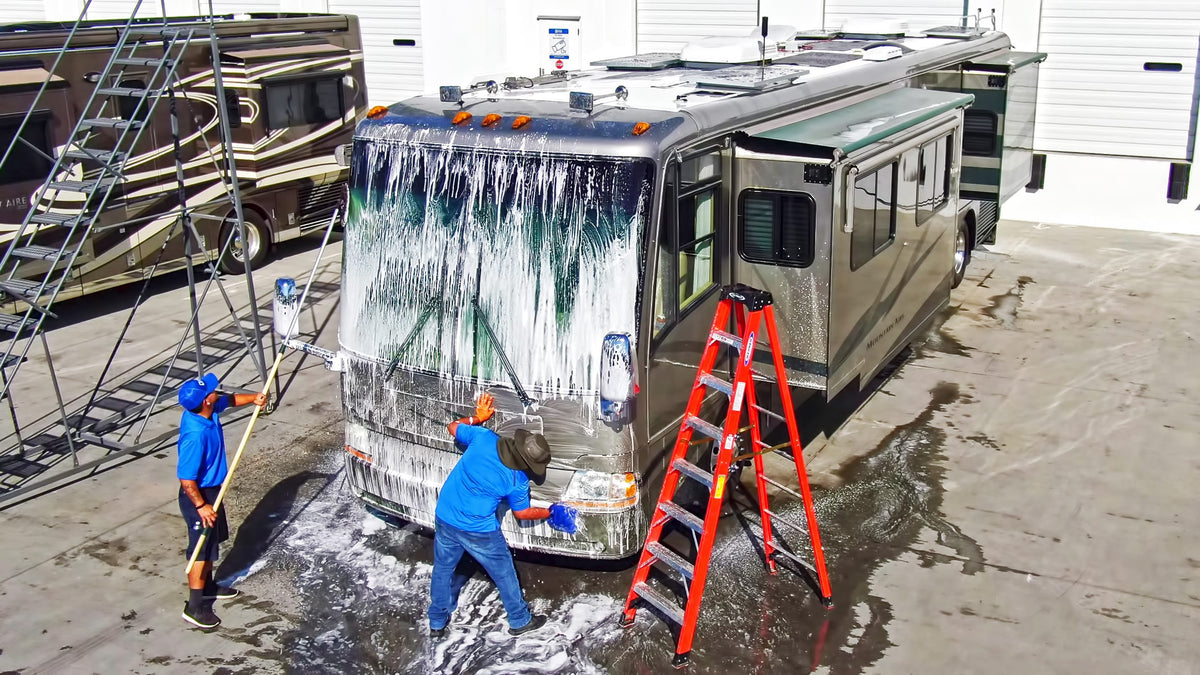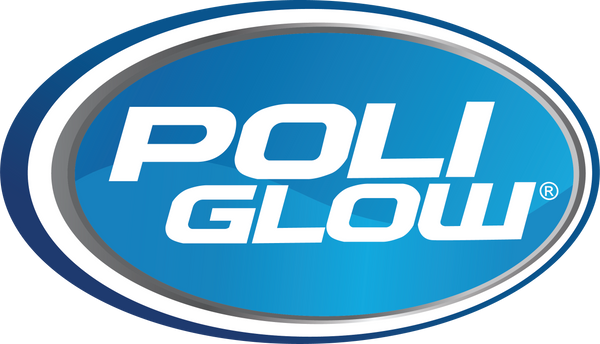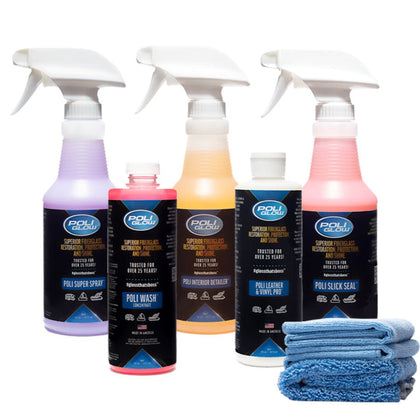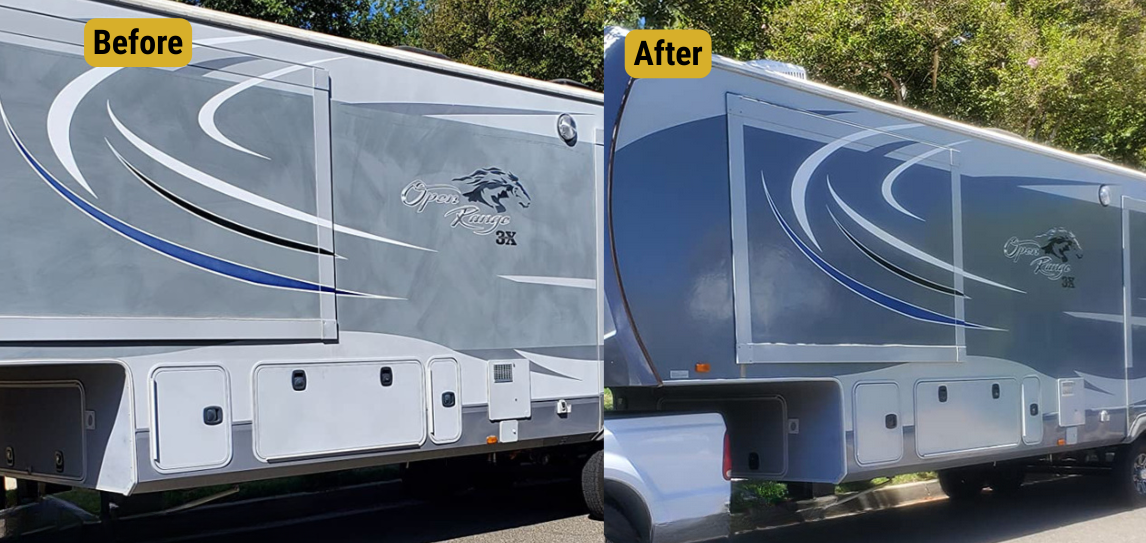
Roaming in Luxury: Elevate Your Adventures with Pro-Level RV Detailing
Time to read 19 min
Recreational vehicles represent more than just a mode of transportation; they encapsulate the essence of adventurous living and the comforts of home on the move. As these sophisticated machines juggle both vehicular and residential roles, their maintenance demands a unique approach. RV detailing is a comprehensive and meticulous process involving thoroughly cleaning, restoring, and maintaining a recreational vehicle's interior and exterior. This practice extends beyond routine washing and encompasses procedures such as deep cleaning, polishing, waxing, and targeted attention to specific components, including upholstery, carpets, appliances, and more. This article delves into the specialized world of RV detailing, highlighting its significance in preserving the vehicle's aesthetics, functionality, and value. Whether you're a seasoned RV enthusiast or new to the nomadic lifestyle, understanding the nuances of professional RV detailing is essential for ensuring your vehicle's longevity and peak performance.
Importance of RV Detailing
RVs serve a dual purpose: they function as both a mode of transportation and a home away from home. This unique combination subjects them to wear and tear from both road conditions and daily living activities. Proper RV detailing is paramount, and its importance can be understood through the following aspects:
- Preservation of Value: Like any other vehicle, an RV's exterior and interior condition significantly affect its resale value. Regular detailing ensures the RV retains its original appearance, protecting the investment and ensuring a higher resale or trade-in value.
- Aesthetic Appeal: Over time, road grime, bird droppings, tree sap, and other contaminants can mar the appearance of an RV. Detailing restores the vehicle's shine and luster, making it a sight to behold on the open road.
- Protection Against Elements: RVs are often exposed to various environmental factors, including sun, rain, snow, and dust. Detailing provides a protective layer against these elements, reducing the risk of paint fading, oxidation, and other environmental damage.
- Enhanced Interior Hygiene: The interior of an RV, where cooking, sleeping, and daily activities occur, can become a breeding ground for bacteria and mold. Professional detailing ensures thorough cleaning, sanitizing, and deodorizing of the interior spaces, fostering a healthier living environment.
- Improved Safety: Over time, an RV's windows and mirrors can accumulate dirt and grime, impairing visibility. Detailing ensures these vital components remain clear, promoting safer driving conditions.
- Longevity and Durability: Regular detailing can identify potential issues before they escalate. Addressing minor concerns like small rust spots or sealant cracks early can prevent larger, more expensive problems.
RV detailing is more than just an aesthetic endeavor. It's a comprehensive maintenance practice that preserves the vehicle's value, ensures the safety and health of its occupants, and prolongs the lifespan of the RV, allowing enthusiasts to enjoy their adventures with peace of mind.
What Does Pro-Level RV Detailing Entail?
Pro-level RV detailing goes beyond a simple exterior wash and encompasses a comprehensive range of services to restore, protect, and enhance the RV's interior and exterior. Here's a breakdown of the scope and standards that define professional RV detailing:
- Exterior Deep Cleaning: This is the foundation of any detailing service. It involves using specialized cleaning agents to remove road grime, tar, bird droppings, tree sap, and other contaminants. Every nook and cranny of an RV's exterior surface is meticulously cleaned.
- Paint Restoration and Protection: Over time, an RV's paint can lose its luster due to oxidation and exposure to the elements. Professional detailers polish and restore the paint's original shine using high-grade compounds. This is followed by applying a protective sealant or wax that shields the paint from UV rays, rain, and other potential hazards.
- Window and Glass Treatment: Ensuring the clarity and cleanliness of all glass surfaces is crucial for both aesthetics and safety. Pro-level detailing involves cleaning and polishing windows and mirrors to remove water spots, streaks, and other blemishes and then sealing them to repel water and dirt.
- Wheel and Tire Detailing: Wheels and tires are not just cleaned but also conditioned and protected. This process includes removing brake dust, polishing rims, and applying a protective coating to prevent rust and corrosion.
- Interior Deep Cleaning: The inside of an RV requires as much attention as the outside. This entails vacuuming, steam cleaning carpets and upholstery, wiping down and conditioning vinyl and leather surfaces, and cleaning and sanitizing the kitchen, bathroom, and sleeping areas.
- Odor Elimination: Over time, the interior of an RV can develop odors from cooking, pets, or mold. Pro-level detailing involves using specialized deodorizers and ozone treatments to neutralize and eliminate these odors.
- Meticulous Inspection: After the detailing process, professional detailers conduct a thorough inspection to ensure that no area is overlooked and that the RV meets the high standards the detailing industry sets.
- Specialty Services: Additional services such as ceramic coatings, protective films, or rustproofing treatments are offered to enhance the RV's protection and longevity.
Proper care of an RV is paramount. By adhering to industry standards and using specialized products and techniques, professional detailers offer RV owners the peace of mind that their vehicle is in the best possible hands.
The Exterior Transformation: Exterior RV Detailing
Recreational vehicles often bear the brunt of nature's elements during their journeys. Among these elements, UV rays, dirt, and moisture pose notable threats to an RV's exterior. A strategic approach to UV protection, combined with proper cleaning techniques and timely damage control, can significantly prolong the life and aesthetics of an RV.
- UV Protection: Prolonged exposure to UV rays can harm an RV's exterior. The harmful rays can cause fading, make paint brittle, and accelerate the aging process of rubber and plastic components. To combat these adverse effects:
- Apply high-quality UV protective wax or sealant. These products form a barrier that reflects harmful UV rays, preserving the paint's vibrancy.
- Use protective covers or shades when the RV is stationary for extended periods. These physical barriers can significantly reduce UV exposure.
- Proper Cleaning Techniques: Regular and appropriate cleaning is fundamental to maintaining an RV's exterior. Consider the following:
- Use pH-balanced cleaning solutions specifically designed for RVs. These solutions efficiently remove dirt without causing harm to the paint or finishes.
- Employ soft bristle brushes and microfiber cloths to prevent scratches during cleaning. Gently scrubbing in a circular motion can help lift dirt without causing micro-abrasions.
- Always rinse the RV with clean water before and after cleaning to ensure that all dirt particles are removed, reducing the risk of scratches.
- Addressing Oxidation: Over time, due to UV exposure and environmental pollutants, the RV's exterior may begin to oxidize, leading to a chalky and faded appearance. To counteract this:
- Employ a specialized oxidation remover, followed by polishing to restore the original shine.
- Regular application of protective sealants can prevent or reduce the rate of oxidation in the future.
- Scratches and Scuffs: Minor abrasions are almost inevitable with frequent use. To handle these:
- Use fine-grit sandpaper or a rubbing compound to level the affected area gently.
- After leveling, apply a layer of touch-up paint and polishing to blend the area seamlessly with the surrounding surface.
- Combatting Water Damage: Moisture, if left unchecked, can lead to mold, rust, or water stains. For prevention and remediation:
- Ensure that the RV's exterior is dried thoroughly after cleaning or exposure to rain. Special attention should be given to crevices, seams, and hidden pockets.
- Check and seal any potential gaps or leaks promptly. Not only can these lead to exterior damage, but they can also compromise the RV's interior.
- Use a specialized cleaning solution for water stains, ensuring that the surface is adequately protected afterward.
The external transformation of an RV hinges on proactive care and timely interventions. By understanding the importance of UV protection, employing proper cleaning methods, and promptly addressing damages, RV owners can ensure their vehicle remains pristine and ready for many more adventures.
Inside the Living Quarters: Interior RV Detailing
The interior of an RV is both a living space and a testament to the adventures it has witnessed. Maintaining its cleanliness and condition is not just about aesthetics; it’s about ensuring a comfortable and healthy environment for its occupants. Every detail matters, from the plushness of the upholstery to the sparkle on hard surfaces.
- Cleaning and Conditioning Upholstery:
- Regular Vacuuming: Start by vacuuming upholstery to remove dust and loose debris. Use attachments for crevices and folds to ensure thorough cleaning.
- Spot Cleaning: For stains, it's crucial to act swiftly. Use a gentle cleaning solution appropriate for the fabric type. Always test on a hidden area first to ensure no discoloration occurs.
- Conditioning: After cleaning, apply a conditioner to keep the material supple and prevent cracking for leather or faux-leather upholstery. Conditioning not only enhances the look but also extends the lifespan of the material.
- Maintaining Hard Surfaces:
- Regular Wiping: Dust and clean hard surfaces using a microfiber cloth to capture dust without scratching surfaces.
- Specialized Cleaners: Use cleaning solutions specific to the material, be it wood, laminate, or metal surfaces. Avoid all-purpose cleaners that might be too harsh for some surfaces.
- Polishing: Periodically, consider polishing wooden surfaces to retain their shine and provide a protective layer against moisture and spills.
- Addressing High-Traffic Areas:
- Flooring: Given its constant use, the floor requires regular cleaning. Vacuum carpets frequently and mop hard floors with a suitable cleaner. Use floor mats at entrances to trap dirt and reduce wear.
- Kitchen and Bathroom: These areas are prone to moisture and spills. Clean them regularly, ensuring surfaces are dried properly to prevent mold growth.
- Storage Compartments: These can accumulate clutter and dirt. Periodically empty, clean, and reorganize them to ensure optimal use and cleanliness.
- Maintaining Indoor Air Quality:
- Ventilation: Regularly air out the RV to reduce indoor pollutants and ensure a fresh environment. Ensure vents are clean and free from obstructions.
- Air Purifiers: Consider using a compact air purifier to reduce allergens and airborne particles, especially if traveling in areas with poor air quality or during pollen seasons.
- Humidity Control: High humidity can lead to mold growth and reduced comfort. Use dehumidifiers if necessary, and always ensure adequate ventilation, especially after cooking or showering.
Regular maintenance, attention to detail, and addressing specific areas ensure a visually pleasing space that’s healthy and comfortable for all occupants. Proper care of the living quarters translates to a better travel experience.
Engine and Undercarriage Care in RV Detailing
RV detailing extends beyond the visible exterior and interior surfaces. A comprehensive RV detailing regimen delves into areas that aren't immediately obvious but are critically important for the vehicle's overall health and performance. Two such areas that merit careful attention are the engine and the undercarriage.
The engine, being the central component of an RV, demands regular maintenance. Proper engine detailing can prevent issues such as overheating and ensure efficient performance. Regular inspections can identify concerns like leaks or worn-out belts, and promptly addressing these issues can preserve the engine's performance. Moreover, a well-maintained engine compartment can enhance the RV's resale value, indicating to potential buyers that the vehicle has been well-managed.
Concurrently, the undercarriage, though not immediately visible, is consistently exposed to contaminants, including dirt and road salts. If left unattended, these contaminants can lead to corrosion, thereby affecting the RV's structural integrity. Regular detailing of the undercarriage provides protection against these elements, ensuring the durability of the vehicle's components and guaranteeing a safer and smoother drive. Proper attention to the engine and undercarriage is vital for optimal RV performance and preservation.
Specialized Treatments in RV Detailing: Beyond Basic Maintenance
When it comes to RV detailing, certain treatments stand out, not just for the protection they offer but for their ability to elevate the overall RV experience. These specialized treatments can significantly extend the lifespan of an RV, providing a barrier against the elements and enhancing the vehicle's visual appeal.
- Sealants: Sealants are synthetically formulated products designed to provide a protective layer on the RV's exterior surface. They act as a barrier against harmful UV rays, rain, and other environmental factors. While regular waxes provide a similar protective function, sealants tend to last longer and offer more durable protection.
- Ceramic Coatings: Ceramic coatings represent the pinnacle of exterior protection. These nanoparticle-based coatings adhere directly to the RV's paint to form a durable and resilient layer. The result is a surface that repels water, resists minor scratches, and is easier to clean. In addition, ceramic coatings often give the RV a glossy, almost liquid-like finish that retains its shine for an extended period.
- Advanced Protection Options: As technology evolves, so do protective treatments. Innovations in the detailing industry have led to treatments that offer even greater resilience against contaminants, UV rays, and oxidation. Investing in advanced protection options can be a wise choice for those looking for long-term solutions.
- Anti-microbial Treatments: The interior of an RV can become a breeding ground for microbes. Anti-microbial treatments are crucial in maintaining a clean and hygienic RV interior. These treatments work by inhibiting the growth of bacteria, mold, and mildew. Beyond the evident health benefits, these treatments can also help prevent unpleasant odors and prolong the life of interior fabrics and surfaces. Investing in anti-microbial treatments ensures a healthier and more enjoyable RV experience.
While regular detailing is vital for any RV's upkeep, specialized treatments offer an added layer of protection and enhancement. Whether aiming to preserve the RV's appearance or ensure a safe interior environment, these advanced options can be invaluable for the discerning RV owner.
Essential Equipment and Products for Comprehensive RV Detailing

RV detailing is a specialized area of vehicle maintenance, requiring a unique set of tools and products to ensure a thorough and effective job. Understanding the significance of each tool and its role in the detailing process is essential for achieving professional-level results.
- High-Quality Brushes: Brushes are indispensable for cleaning various parts of an RV. Soft-bristled brushes are crucial for gently cleaning delicate surfaces like windows and paintwork, while harder brushes are more appropriate for areas like tires and grills where stubborn dirt and grime can accumulate.
- Microfiber Cloths and Mitts: Made of special synthetic fibers, microfiber towels and mitts are known for their high absorbency and gentle cleaning capabilities. They're ideal for drying the RV, removing polish, and applying wax without scratching the surface.
- Pressure Washer: A pressure washer is essential for effectively removing accumulated dirt and grime from the RV's exterior. It's beneficial for cleaning hard-to-reach areas like the roof and undercarriage.
- Vacuum Cleaner with Attachments: A robust vacuum cleaner, preferably with multiple attachments, thoroughly cleans the RV's interior. The different attachments can get into crevices, clean upholstery, and easily manage tight corners.
- Polishers and Buffers: Electric polishers and buffers make the job of shining the RV's exterior more efficient. They ensure even application and removal of products, resulting in a consistent and shiny finish.
- Specialized Cleaners: There are cleaners tailored for every part of an RV, from glass cleaners for exterior windows to specific products for treating leather, vinyl, and other materials found inside the RV.
- Protective Products: It's crucial to apply protective products after cleaning. Sealants, waxes, and ceramic coatings provide a protective barrier against environmental factors, ensuring the RV remains in pristine condition for longer.
- Air Compressors and Blowers: These are especially useful for drying hard-to-reach areas after washing. A good air blower can remove water from crevices, reducing the risk of water spots or corrosion.
Equipping oneself with the right tools and products is paramount for professional RV detailing. These tools ensure the RV remains in optimal condition and enhance the vehicle's longevity and appearance.
Professional vs. DIY: When to Call in the Experts for RV Detailing
The allure of maintaining and detailing one's RV can be tempting for many owners. The satisfaction derived from a hands-on approach and potentially saving costs might sway some towards a DIY route. However, understanding the distinction between professional and DIY detailing is vital in ensuring that the RV receives the care it deserves.
- Expertise and Knowledge: Professional detailers undergo rigorous training and have experience handling various RV models and makes. They are equipped with knowledge of the latest techniques, products, and equipment, ensuring that the RV gets the best possible care. A DIY approach might lack this expertise, leading to potential mistakes.
- Time Commitment: Detailing an RV is a time-intensive process. It can consume a significant amount of time for those unaccustomed to the intricacies involved. Professionals can often complete the task in a shorter timeframe, ensuring efficient and thorough service.
- Specialized Equipment: A range of specialized tools are involved in RV detailing, from pressure washers to specific cleaning agents. While some might be available for purchase, the cost and knowledge required to use them effectively might not justify a DIY approach.
- Comprehensive Service: Professional services usually offer a comprehensive package that addresses every aspect of RV care — from engine detailing to interior conditioning. A DIY effort might miss out on some of these nuances, potentially leaving some areas untreated.
- Damage Prevention: Improper techniques or incorrect product usage can result in damage, such as paint swirls, scratches, or upholstery stains. Professionals are trained to avoid these pitfalls, ensuring that the RV remains in optimal condition.
- Cost Implication: While hiring professionals might seem like a higher upfront cost, the long-term benefits often justify the expenditure. Considering the potential risk of damage or depreciation in RV value due to inadequate detailing, the professional route can sometimes be more cost-effective in the long run.
- Warranty and Assurance: Many professional detailing services provide warranties or guarantees. This assurance, coupled with liability insurance, offers peace of mind to RV owners.
While DIY detailing can be a rewarding experience for some, understanding the limitations and potential risks is crucial. For those who view their RV as a significant investment and want to ensure its longevity and pristine condition, calling in the experts might be the best course of action.
Selecting the Right RV Detailing Service
Choosing an appropriate RV detailing service is essential for ensuring optimal vehicle maintenance. Here are crucial factors to consider when choosing an RV detailing service:
- Certifications and Training: Professionalism and expertise are pivotal in the realm of RV detailing. Seek services that employ certified and trained detailers. Certifications from reputable organizations signify a commitment to quality and continuous education. Detailers with specialized training possess the knowledge and skills for meticulous and comprehensive RV care.
- Transparency in Pricing: Transparency in pricing is vital to avoid unforeseen expenses. Reputable RV detailing services present transparent and detailed pricing structures for various packages and treatments. Inquire about the inclusions of each package to comprehensively understand the services covered. Avoid providers that offer ambiguous or unclear pricing information.
- Range of Services: Depending on the size, materials, and condition of the RV, its requirements will vary. Choose a detailing service that offers a variety of packages and treatments tailored to the specific needs of your RV. Whether you need exterior protection, interior cleaning, or specialized treatments, a service with customizable options will ensure that your RV receives individualized care.
- Quality Products and Equipment: The products and equipment utilized are inextricably linked to the detailing quality. Inquire about the varieties and brands of products used. Reputable detailing services utilize premium, professional-grade products to achieve superior results. In addition, evaluate their equipment since advanced tools can significantly impact the outcome of the detailing process.
- Customer Service and Communication: Reliable RV detailing services prioritize transparent communication and exceptional customer service. Note the prospective provider's responsiveness, willingness to answer questions, and ability to accommodate your scheduling preferences when engaging with them. Effective communication facilitates a seamless and straightforward detailing experience.
- Research and Reputation: Look for professional detailers with a solid reputation. Online reviews, testimonials, and recommendations from fellow RV owners can offer invaluable insights into the quality of service provided.
Selecting the right RV detailing service is pivotal to safeguarding your vehicle's well-being, aesthetics, and value. By considering the above factors and conducting thorough research, RV owners can ensure they select a service that aligns with their expectations and delivers value for money.
Tailored Detailing for Different RV Types
There are numerous categories of recreational vehicles, each with its own characteristics and detailing requirements. Understanding the differences between Class A, B, and C motorhomes, travel trailers, and fifth wheels is paramount for tailored detailing. Here's a deeper dive into the specific requirements for each RV category.
- Class A Motorhomes: The Luxury Liners
- Size and Structure: Class A motorhomes are the largest of the RV categories, often resembling buses in structure. Their expansive surface area requires extensive attention during detailing.
-
Detailing Focus: Given their size, the roof, and large sidewalls can accumulate more debris and contaminants. Specific detailing tools designed for expansive surfaces can make the cleaning more efficient. In addition, the high-end finishes commonly found in Class A motorhomes require the use of premium cleaning agents to preserve their luster.
- Class B Motorhomes: The Campervans
- Size and Structure: Class B motorhomes are the smallest and are commonly called campervans. Their compact nature poses unique detailing challenges.
- Detailing Focus: These motorhomes often have less exterior surface area but more intricate detailing regions, especially on the interior. Given their size, their interiors can quickly get cluttered; therefore, maximizing space while cleaning and organizing is essential.
- Class C Motorhomes: The Middle Ground
- Size and Structure: Larger than Class B but smaller than Class A, Class C motorhomes often have a distinctive cab-over profile.
-
Detailing Focus: The cab-over section can be a hotspot for debris accumulation. Special attention is required for this section. Additionally, the blend of exterior size and interior intricacies requires a balanced detailing approach, ensuring both spaces are meticulously maintained.
- Travel Trailers: Towable Homes
- Size and Structure: Travel trailers come in various sizes and are towed behind vehicles. Their structure can range from simple to multi-sectional.
-
Detailing Focus: Their towable nature means the frontal area might accumulate more dirt and grime during travels. Particular attention to the hitch and undercarriage is also essential, as these areas are exposed to road conditions more directly.
- Fifth Wheels: The Spacious Towables
- Size and Structure: Fifth wheels are similar to travel trailers but are attached to trucks using a hitch in the truck bed, making them more stable and spacious.
-
Detailing Focus: The attachment area, or the 'fifth wheel,' requires special attention due to its critical role in connecting the RV to the towing vehicle. The often multi-level structure and varying materials necessitate a specific detailing approach.
Detailing an RV isn't a one-size-fits-all endeavor. Recognizing the unique features and challenges posed by different RV categories ensures that detailing is both effective and efficient, preserving the integrity and longevity of these mobile abodes. Properly tailored detailing not only enhances the aesthetic appeal of an RV but also ensures its functionality and safety on the road.
Preserving Your RV's Value: The Significance of Regular Detailing
RVs represent a significant investment for most owners, often serving as a mobile home-away-from-home. Therefore, preserving its value becomes paramount. Regular detailing plays a pivotal role in maintaining its aesthetic appeal, extending its lifespan, and ensuring optimum resale value. Here's a closer look at the significance of this practice.
- Protection Against Environmental Damage: Regular exposure to elements like sunlight, rain, and road salts can erode the RV's exterior paint and finish. Detailing, particularly when done regularly, provides a protective layer, guarding against ultraviolet rays, moisture, and other environmental contaminants. This preservation ensures the RV remains in top condition, directly influencing its resale value.
- Addressing Wear and Tear: The RV's interior is subject to considerable wear and tear, especially in high-traffic areas. Regular detailing ensures that upholstery remains fresh, surfaces are clean and free from damaging agents, and the overall ambiance inside the RV is pleasant, enhancing the overall user experience.
- Preventing Long-term Damage: Detailing is more than just superficial cleaning. It also involves checking for early signs of rust, corrosion, or damage that could become severe if neglected. Addressing these issues at their onset safeguards the RV's structural integrity, extending its lifespan.
- Enhancing Resale Value: Potential buyers or dealers assess RVs based on their condition. An RV that's been regularly detailed exudes a well-maintained look, often fetching a better price in the resale market than a neglected one.
- Preparing for Storage or Off-season: Detailing before storage is essential. It ensures that contaminants, which can cause damage over prolonged periods, are removed. Moisture, residues, or pests can lead to complications if an RV is stored without thorough cleaning. Furthermore, interiors benefit from a detailing session before storage, ensuring that the air quality remains pristine and mold or mildew doesn't find a conducive environment to thrive.
- Preserving Functionality: Cleaned and lubricated components, such as slide-outs or awnings, operate more efficiently and are less prone to malfunctions, preserving the RV's functionality.
- Safeguarding Health: A clean RV is also a healthier RV. Regularly detailing ensures that the interior environment remains safe for its inhabitants by eliminating dust, allergens, and potential mold or mildew.
Regular detailing of an RV is not a mere luxury; it's a necessity for those aiming to preserve the value and functionality of their investment. Especially crucial before long-term storage, this practice ensures that the RV remains protected from potential damages, ready to provide an optimal experience in the subsequent seasons.
Elevate your RV adventures to pro-level luxury with Poli Glow, a specialized restoration and protection system designed exclusively for RVs. As you roam, your RV's exterior can face the challenges of oxidation and wear. Poli Glow offers a unique process using products like Poli Prep™, Poli Ox™, and Poli Glow® to rejuvenate and seal the surface, delivering a brilliant high-gloss finish. Unlike traditional waxes and polishes, the effective adhesion of Poli Glow® offers robust defense against oxidation, concurrently revitalizing the look of aging RVs. A range of RV types, including motorhomes, campers, travel trailers, fifth wheels, toy trailers, and popup trailers, have benefited from the safeguarding and enhancement provided by Poli Glow®. Embrace the convenience and longevity Poli Glow brings, ensuring your RV maintains its vibrant shine during your journey into luxury RV detailing.







